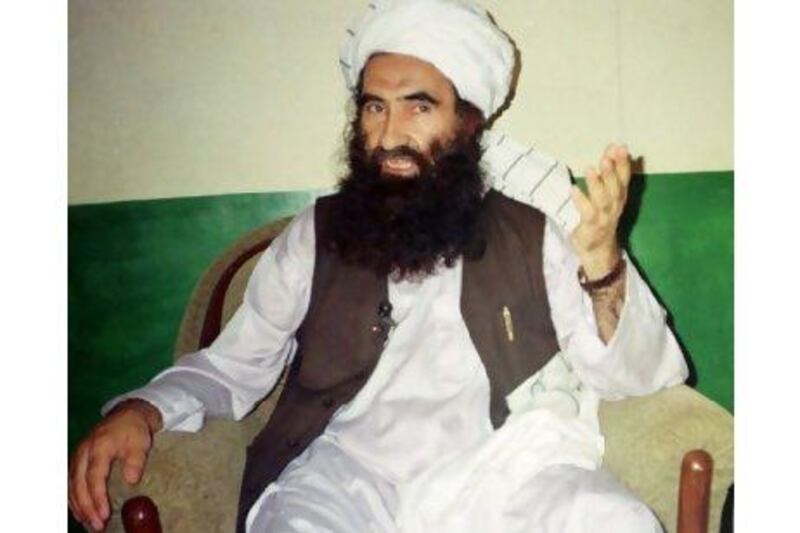ISLAMABAD // A barrage of accusations by senior US officials that the Pakistani army and its spy agency support militants targeting American troops in Afghanistan has further frayed an already shaky alliance.
On Thursday, Admiral Mike Mullen, the chairman of the US Joint Chiefs of Staff, accused Pakistan's spy agency, the Inter-Services Intelligence Directorate (ISI), of directly aiding the militant Haqqani network in the September 13 attack on the US embassy in Kabul.
He also alleged they were involved in a September 10 lorry bomb attack that injured 77 Americans at a base in Wardak province.
Adm Mullen has described the Haqqani network as a "veritable arm" of the ISI.
The US defence secretary, Leon Panetta, hinted on Thursday that the country might take unilateral action against the Haqqani network. He said he did not think the Pakistanis "would be surprised by the actions we might or might not take", without giving any details.
The accusations and veiled warnings were met with defiance by Pakistani officials.
Gen Ashfaq Parvez Kayani, the Pakistani army chief, said that the US allegations were "not based on facts" and denied that ISI supports the Haqqani network.
Gen Kayani said that "Admiral Mullen knows fully well which countries are in contact with the Haqqanis".
The Haqqanis are based in North Waziristan, the north-west Pakistani tribal region straddling the border with Afghanistan.
But their influence extends to the Paktia, Paktika and Khost provinces of Afghanistan.
Estimated to have 10,000 to 15,000 fighters, the Haqqani network is described by the US as its most potent foe in the region.
Pakistanis say that they have little operational control over the Haqqanis, who have allegiance to Mullah Muhammed Omar, the Taliban leader.
Pakistan has consistently balked at US demands to launch a military operation in North Waziristan, fearing a fierce blowback inside the country.
But the Haqqani network is also seen as a counterweight available to Pakistanis to any future Indian influence in Afghanistan once US troops leave the region. Pakistani officials and analysts say that as the US efforts against the Taliban have faltered in Afghanistan, it has started to use Pakistan as a scapegoat for its own failures.
"You cannot afford to alienate Pakistan," Hina Rabbani Khar, the Pakistani foreign minister, said in New York last week on the sidelines of the UN General Assembly session.
"If they are choosing to do so, it will be at their own cost," Ms Khar said, adding that "anything which is said about an ally, about a partner, publicly to recriminate it, to humiliate it, is not acceptable".
Pakistani Islamist opposition politicians have also condemned the American threats.
"The US is planning to launch an attack on Pakistan on the pretext of hot pursuit. The Haqqani network and ISI relation is a mere drama to materialise its plan," said Qazi Hussain Ahmed, a former leader of Jamaat-e-Islami, the country's oldest religious political party.
Analysts view the verbal spats as both sides scrambling to have better leverage over the other.
"The US and Pakistan are engaged in a game of high-stakes brinkmanship as they battle to secure an Afghanistan endgame to their own favour," said Arif Rafiq, an analyst based in Washington.
"A real rupture is possible, especially if US forces enter Pakistani territory by helicopter or land and engage in hostilities with Pakistani forces."
Omar R Quraishi, op-ed page editor of The Express Tribune, a Karachi-based English daily newspaper, agreed that the current standoff with the US "is the worst in living memory" and warned that it "does not augur well for Pakistan, not only in military terms but also in economic terms".
"The Americans have laid their cards out on the table and, at the very least, expect Pakistan to take measures to neutralise Haqqani network's ability to strike at American and Nato forces," Mr Quraishi said.
Mr Rafiq said that "despite US pressure, the Pakistani military is unlikely to sever ties with the Haqqani network 10 years into a war that is close to its end".
He added: "The recent Kabul attacks contribute to the Afghan insurgents' strategic advantage.
"Why wouldn't the Pakistani military continue to place its bets on the stronger horse?
"Washington is likely to be the first to blink as it can't afford sustained conflict with Islamabad.
"All-out hostility with Islamabad could result in greater militant attacks in Afghanistan and an upsurge in nationalist sentiment in Pakistan, emboldening military hardliners and perhaps even threatening the civilian politicians Washington hopes will eventually supplant the military.
"Washington's options vis-à-vis Islamabad are limited."
With Pakistan-US relations ebbing to a new low, Mr Rafiq offered a grim prognosis.
"The Obama administration's Pakistan policy is in total disarray," he said.
"It now risks having to police an Afghan civil war as it faces the spectre of another recession at home in an election year."
Despite the public sparrings, Gen James Mattis, head of the US Central Command, arrived in the country late on Friday to hold talks with Gen Kayani.
[ foreign.desk@thenational.ae ]






